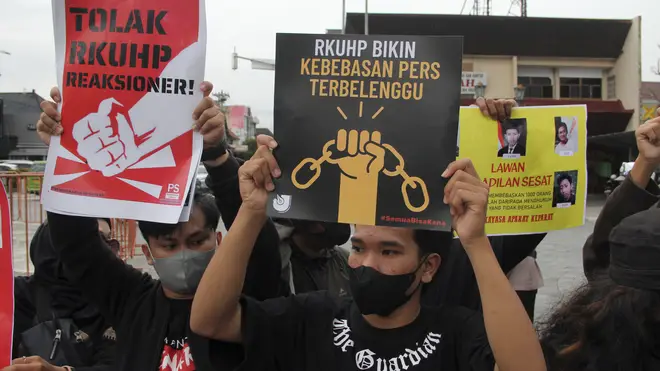
Election Night Live 10pm - 6am
6 December 2022, 14:34

The law will apply to Indonesian citizens as well as foreigners.
Indonesia’s parliament has unanimously passed a revision of the country’s penal code that criminalises sex outside of marriage for citizens as well as foreigners.
The long-awaited move also prohibits the promotion of contraception and bans defamation of the President and state institutions.
The amended code also expands an existing blasphemy law and maintains a five-year prison term for deviations from the central tenets of Indonesia’s six recognised religions: Islam, Protestantism, Catholicism, Hinduism, Buddhism and Confucianism.
Citizens can face a 10-year prison term for associating with organisations that follow Marxist-Leninist ideology and a four-year sentence for spreading communism.
The code maintains the previous criminalisation of abortion but adds exceptions for women with life-threatening medical conditions and for rape, provided that the foetus is less than 12 weeks old, in line with what is already provided in a 2004 Medical Practice Law.

Rights groups criticised some of the revisions as overly broad or vague and warned that adding them to the code could penalise normal activities and threaten freedom of expression and privacy rights.
However, some advocates hailed the passage as a victory for the country’s LGBTQ community. During fierce deliberation, legislators eventually agreed to remove an article proposed by Islamic groups that would have made gay sex illegal.
The revised code also preserves the death penalty within the criminal justice system despite calls from the National Commission on Human Rights and other groups to abolish capital punishment, as dozens of other countries have done. But under the new code, the death penalty has a probationary period.
If within a period of 10 years the convict behaves well, then the death penalty will be changed to life imprisonment or 20 years’ imprisonment.
Under Indonesian regulations, legislation passed by parliament becomes law after being signed by the President. But even without the President’s signature, it automatically takes effect after 30 days unless the president issues a regulation to cancel it.
President Joko Widodo is widely expected to sign the revised code in light of its extended approval process in parliament.
But the law is likely to gradually take effect over a period of up to three years, according to deputy minister of law and human rights Edward Hiariej.
“A lot of implementing regulations must be worked out, so it’s impossible in one year,” he said.

The amended code says sex outside marriage is punishable by a year in jail and cohabitation by six months, but adultery charges must be based on police reports lodged by a spouse, parents or children.
It restores a ban on insulting a sitting president or vice president, state institutions and the national ideology. Insults to a sitting president must be reported by the President and can lead to up to three years in jail.
The penal code had languished for decades while legislators in the world’s biggest Muslim-majority nation struggled with how to adapt its traditional culture and norms to the code, a legacy of the Dutch colonial administration. Indonesia proclaimed independence on August 17 1945.
A parliamentary taskforce finalised the bill in November and MPs unanimously approved it on Tuesday.
Human Rights Watch said that laws penalising criticism of public leaders are contrary to international law, and the fact that some forms of expression are considered insulting is not sufficient to justify restrictions or penalties.
Andreas Harsono, a senior Indonesia researcher at the group, said: “The danger of oppressive laws is not that they’ll be broadly applied, it’s that they provide avenues for selective enforcement.”
Many hotels, including in tourism areas such as Bali and metropolitan Jakarta, will risk losing visitors, he added.
“These laws let police extort bribes, let officials jail political foes, for instance, with the blasphemy law,” Mr Harsono said.